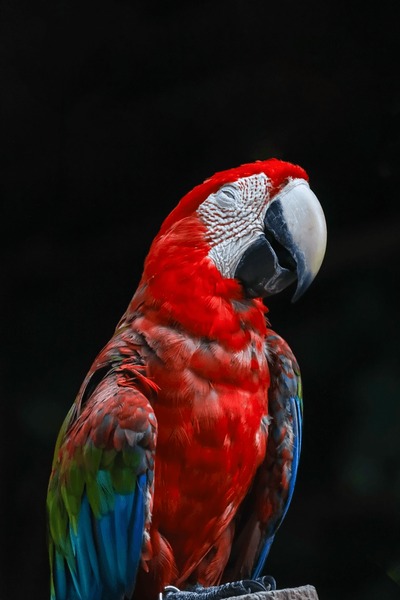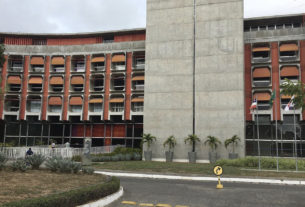text in englesh berow
Projeto desenvolvido pelo IBAMA em Porto Seguro (BA) reintroduziu 35 exemplares de arara-vermelha-grande em área vizinha à Reserva Particular do Patrimônio Natural Estação Veracel, e a companhia tem realizado ações de comunicação para a sensibilização da comunidade local. Saiba o que fazer se encontrar uma das aves
Eunápolis, 10 de julho de 2024 – Em uma ação inédita realizada na última semana, o Instituto Brasileiro do Meio Ambiente e dos Recursos Naturais Renováveis (IBAMA) acaba de reintroduzir na natureza, na Mata Atlântica do Sul da Bahia, um grupo de 35 araras-vermelhas-grandes (Ara chloropterus). As aves, cuja espécie chegou a ser extinta em ambiente natural entre os séculos 19 e 20, são provenientes de cativeiros e foram apreendidas em operações de combate ao tráfico de animais silvestres. A Reserva Natural do Patrimônio Natural (RPPN) Estação Veracel entrou como uma parceira do projeto, para apoiar o IBAMA em ações de conscientização ambiental junto às comunidades na região Sul da Bahia sobre a importância da preservação da espécie.
A reintrodução dos animais foi um projeto desenvolvido pelo Centro de Triagem de Animais Silvestres (Cetas) do IBAMA em Porto Seguro, contando com o apoio de diversas entidades e organizações ambientais. A primeira ação de reintrodução ocorreu na Estação Ecológica do Pau-Brasil, em Porto Seguro, em local próximo da área da RPPN Estação Veracel. A presença da mata nativa bem preservada nessa região foi crucial para a escolha do local de soltura, proporcionando um habitat adequado para as aves.
“A união de esforços possibilitou a soltura do primeiro grupo de araras-vermelhas-grandes, individualmente identificadas para permitir seu monitoramento na natureza,” afirma Cid José Teixeira, chefe do Cetas/BA. “O sucesso da reintrodução será avaliado pelo monitoramento pós-soltura de longo prazo, que inclui o acompanhamento dos animais e o registro do consumo de alimentos disponíveis na natureza, da ocupação das caixas-ninhos e da produção de filhotes. A meta é alcançar a persistência de uma população selvagem sem intervenção humana”, diz ainda Teixeira.
O que fazer se encontrar uma arara-vermelha-grande?
A Reserva Particular do Patrimônio Natural (RPPN) Estação Veracel é reconhecida na região Sul da Bahia devido aos seus mais de 6 mil hectares preservados de Mata Atlântica, além de desempenhar um papel crucial ao conduzir programas de educação ambiental com a população no entorno da área de soltura.
“É fundamental que a comunidade do sul da Bahia esteja ciente e participe ativamente na preservação dessas araras-vermelhas reintroduzidas. Ao avistar uma arara-vermelha, é importante não capturar esses indivíduos, uma vez que as aves têm um papel importante no equilíbrio ambiental. A presença dessa espécie é relatada em vários documentos de Pedro Álvares Cabral, em 1500. As aves são emblemáticas para a história do Brasil! Precisamos que as pessoas tenham consciência de sua importância e que é papel de todos nós garantir sua proteção e seu bem-estar”, destaca Virginia Londe de Camargos, bióloga e gerente de Meio Ambiente da Veracel.
A especialista destaca algumas dicas para que a população saiba o que fazer se avistar um dos animais na região, que tendem a circular nas áreas de reserva nativa da região:
Mantenha uma distância segura: Quando encontrar uma arara-vermelha, admire sua beleza de longe. Aproximar-se demais pode estressar a ave e interferir em seu comportamento natural.
● Não alimente as araras: As araras precisam aprender a encontrar seu próprio alimento na natureza. Alimentá-las pode torná-las dependentes e dificultar sua adaptação ao ambiente selvagem.
● Não capture ou tente acariciar as aves: Capturar ou tentar manter a arara como animal de estimação é ilegal e prejudicial ao ecossistema. A intenção é que elas possam restabelecer sua população em seu habitat natural, e não devemos interferir. Lembrando que essas aves são protegidas por lei. Além disso, a captura pode causar estresse severo e até lesões nos animais.
● Relate avistamentos: Se avistar uma arara-vermelha, reporte a localização ao IBAMA. Isso ajuda no monitoramento e na proteção das aves.
● Compartilhe informações com amigos e familiares: Explique a importância de deixar as araras viverem livres na natureza. A educação ambiental é fundamental para a conservação das espécies.
● Conserve a mata nativa: Não faça desmatamento e promova o plantio de árvores nativas. As araras precisam de um ambiente saudável e diversificado para sobreviver e prosperar.
● Não entre em áreas restritas: As áreas de soltura são cuidadosamente selecionadas para a reintrodução das aves. Respeitar essas áreas garante que as araras possam se adaptar ao seu novo ambiente.
O Cetas/BA do IBAMA em Porto Seguro pode ser acionado pelo telefone (71) 98426-6575 ou pelo e-mail [email protected]. Também é possível avisar a Polícia Ambiental (CIPPA) de Porto Seguro pelo telefone (73) 99807-1353, e a Secretaria de Meio Ambiente de Porto Seguro pelo telefone (73) 99824-6948.
Sobre a Veracel
A Veracel Celulose é uma empresa de bioeconomia brasileira que integra operações florestais, industriais e de logística, que resultam em uma produção anual média de 1,1 milhão de toneladas de celulose, gerando mais de 3,2 mil empregos próprios e de terceiros, na região da Costa do Descobrimento, sul da Bahia e no Vale do Jequitinhonha, em Minas Gerais. Além da geração de empregos, renda e tributos, a Veracel é protagonista em iniciativas socioambientais no território. A consultoria Great Place to Work (GPTW) validou a Veracel como uma das melhores empresas para trabalhar no Brasil pelo 6º ano consecutivo.
Além dos mais de 100 mil hectares de área protegida ambientalmente, é guardiã da maior Reserva Particular do Patrimônio Natural de Mata Atlântica do Nordeste brasileiro.
Veracel supports IBAMA in monitoring scarlet macaws released in the Atlantic Forest of Southern Bahia
Project developed by IBAMA in Porto Seguro (BA) reintroduced 35 specimens of the great scarlet macaw in an area neighboring the Estação Veracel Private Natural Heritage Reserve, and the company has carried out communication actions to raise awareness among the local community. Find out what to do if you encounter one of the birds
In an unprecedented action carried out last week, the Brazilian Institute of the Environment and Renewable Natural Resources (IBAMA) has just reintroduced into the wild, in the Atlantic Forest of Southern Bahia, a group of 35 great scarlet macaws (Ara chloropterus) . The birds, whose species became extinct in the natural environment between the 19th and 20th centuries, come from captivity and were seized in operations to combat wildlife trafficking. The Natural Heritage Natural Reserve (RPPN) Estação Veracel entered as a partner in the project, to support IBAMA in environmental awareness actions among communities in the southern region of Bahia about the importance of preserving the species.
The reintroduction of animals was a project developed by IBAMA's Wild Animal Screening Center (Cetas) in Porto Seguro, with the support of several environmental entities and organizations. The first reintroduction action took place at the Pau-Brasil Ecological Station, in Porto Seguro, in a location close to the RPPN Estação Veracel area. The presence of well-preserved native forest in this region was crucial for choosing the release site, providing a suitable habitat for the birds.
The union of efforts made it possible to release the first group of scarlet macaws, individually identified to allow them to be monitored in the wild,” says Cid José Teixeira, head of Cetas/BA. "The success of the reintroduction will be assessed by long-term post-release monitoring, which includes tracking the animals and recording their consumption of food available in the wild, nest box occupancy and offspring production. The goal is to achieve persistence of a wild population without human intervention", says Teixeira.
What to do if you find a scarlet macaw
The Estação Veracel Private Natural Heritage Reserve (RPPN) is recognized in the southern region of Bahia due to its more than 6 thousand hectares of preserved Atlantic Forest, in addition to playing a crucial role in conducting environmental education programs with the population surrounding the area. of release.
“It is essential that the community in southern Bahia is aware of and actively participates in the preservation of these reintroduced scarlet macaws. When you see a scarlet macaw, it is important not to capture these individuals, as birds play an important role in environmental balance. The presence of this species is reported in several documents by Pedro Álvares Cabral, in 1500. The birds are emblematic of the history of Brazil! We need people to be aware of their importance and that it is the role of all of us to guarantee their protection and well-being”, highlights Virginia Londe de Camargos, biologist and Environment Manager at Veracel.
The expert highlights some tips so that the population knows what to do if they see one of the animals in the region, which tend to circulate in the region's native reserve areas:
Keep a safe distance: When you encounter a scarlet macaw, admire its beauty from afar. Getting too close can stress the bird and interfere with its natural behavior.
Don't feed the macaws: Macaws need to learn to find their own food in the wild. Feeding them can make them dependent and make it difficult for them to adapt to the wild environment.
● Do not feed the macaws: Macaws need to learn to find their own food in the wild. Feeding them can make them dependent and make it difficult for them to adapt to the wild environment.
● Do not capture or try to pet birds: Capturing or trying to keep a macaw as a pet is illegal and harmful to the ecosystem. The intention is that they can reestablish their population in their natural habitat, and we should not interfere. Remembering that these birds are protected by law. Furthermore, capture can cause severe stress and even injuries to animals.
● Report sightings: If you see a scarlet macaw, report the location to IBAMA. This helps with monitoring and protecting birds.
● Share information with friends and family: Explain the importance of letting macaws live free in the wild. Environmental education is fundamental for the conservation of species.
● Conserve the native forest: Do not deforest and promote the planting of native trees. Macaws need a healthy and diverse environment to survive and thrive.
● Do not enter restricted areas: Release areas are carefully selected for the reintroduction of birds. Respecting these areas ensures that the macaws can adapt to their new environment.
IBAMA's Cetas/BA in Porto Seguro can be contacted by telephone (71) 98426-6575 or by email at [email protected]. It is also possible to notify the Environmental Police (CIPPA) of Porto Seguro by calling (73) 99807-1353, and the Environmental Secretariat of Porto Seguro by calling (73) 99824-6948.
Aboute Veracel
Veracel Celulose is a Brazilian bioeconomy company that integrates forestry, industrial and logistics operations, which result in an average annual production of 1.1 million tons of cellulose, generating more than 3.2 thousand own and third-party jobs, in region of the Discovery Coast, southern Bahia and the Jequitinhonha Valley, in Minas Gerais. In addition to generating jobs, income and taxes, Veracel is a protagonist in socio-environmental initiatives in the territory. The Great Place to Work (GPTW) consultancy validated Veracel as one of the best companies to work for in Brazil for the 6th consecutive year.
In addition to more than 100 thousand hectares of environmentally protected area, it is the guardian of the largest Private Reserve of the Atlantic Forest Natural Heritage in the Brazilian Northeast.






